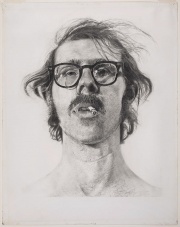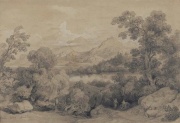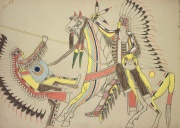Difference between revisions of "Pencil"
| (2 intermediate revisions by the same user not shown) | |||
| Line 1: | Line 1: | ||
| − | [[File:ChuckClose2003 809.jpg|thumb|Chuck Close, Self Portrait<br>MFA | + | [[File:ChuckClose2003 809.jpg|thumb|Chuck Close, Self Portrait<br>MFA# 2003.809 ]] |
| − | [[File:97.764-SC62796.jpg|thumb|Alessandro Castelli<br>MFA | + | [[File:97.764-SC62796.jpg|thumb|Alessandro Castelli<br>MFA# 97.764]] |
== Description == | == Description == | ||
| Line 8: | Line 8: | ||
[[Colored pencil|Colored pencils]] are essentially [[crayon|crayons]] encased in a shaft. | [[Colored pencil|Colored pencils]] are essentially [[crayon|crayons]] encased in a shaft. | ||
| − | [[File:Pencil colored silverhorn.jpg|thumb|Silver Horn (Huangooah)<br>MFA | + | [[File:Pencil colored silverhorn.jpg|thumb|Silver Horn (Huangooah)<br>MFA# 1994.429.24]] |
See also [[colored pencil]], [[wax crayon]] and grease pencil. | See also [[colored pencil]], [[wax crayon]] and grease pencil. | ||
| Line 21: | Line 21: | ||
<gallery> | <gallery> | ||
| − | + | File:Pencil of Gessner .jpg|thumb|Illustration from a book written in 1565 by Konrad Gesner | |
| − | + | File:Pencils.jpg|thumb|Present-day artists' pencils | |
</gallery> | </gallery> | ||
Latest revision as of 16:12, 8 September 2022
Description
A tool for drawing and writing. The word "pencil" is derived from the Latin word for a fine-pointed brush, penicillum. The word was later used to describe a tool for holding a stick of dry media, such as Chalk, Lead, or Graphite. The first picture showing a Lead pencil appears in a 1565 woodcut as an ornate wood tube holding a tapered lead stick. Early lead pencils contained soft metallic Lead points encased in Wood shafts. In the mid 19th century, the Graphite pencil became more popular. The shafts of graphite pencils are made primarily from Graphite mixed with Clay. The earlier name of lead pencil transferred and, though incorrect, its use continued.
Drawing pencils are available in several grades of hardness depending on the relative concentrations of clay, binder and graphite. 9H contains the most clay and is the hardest, while 6B contains little clay and is very soft. Standard writing pencils are graded on a scale of 1 (soft) to 4 (hard).
Colored pencils are essentially crayons encased in a shaft.
See also Colored pencil, Wax crayon and grease pencil.
Synonyms and Related Terms
lead pencil; graphite pencil; art pencil; colored pencil; wax pencil; grease pencil; charcoal pencil; carbon pencil; blyant (Dan., Nor.); Bleistift (Deut.); lápiz (Esp.); crayon mine (Fr.); matita (It.); potlood (Ned.); o³ówek (Pol.); lápis (Port.); blyertspenna (Sven.)
Comparisons
Websites of pastel, pencil, and marker manufacturers
Additional Images
Resources and Citations
- Henry Petroski, The Pencil: A History of Design and Circumstance, Alfred A. Knopf, New York, 1990.
- James Watrous, The Craft of Old-Master Drawings, The University of Wisconsin Press, 1957.
- Ralph Mayer, A Dictionary of Art Terms and Techniques, Harper and Row Publishers, New York, 1969 (also 1945 printing)
- Encyclopedia Britannica, http://www.britannica.com Comment: "Pencil." Accessed 29 Apr. 2004 .
- Wikipedia: http://en.wikipedia.org/wiki/Pencil (Accessed Jan. 15, 2006)
- Random House, Webster's Encyclopedic Unabridged Dictionary of the English Language, Grammercy Book, New York, 1997
- The American Heritage Dictionary or Encarta, via Microsoft Bookshelf 98, Microsoft Corp., 1998




